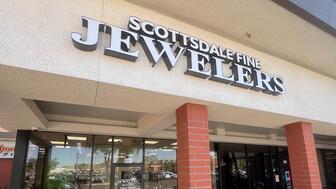“Shell Auranova” is the next generation of the brand’s bridal line, featuring half-bezel engagement rings with bold and fluid designs.
Store Security, Safe Teleworking in the Time of COVID-19
Every single piece of merchandise needs to be stored out of sight, and computer systems need to have adequate protection, JSA says.
New York—Jewelers’ Security Alliance President John J. Kennedy has two main tips for jewelry businesses as the coronavirus drastically alters life across the United States.
First, if jewelers choose to, or are forced to, close their stores, every single piece of merchandise needs to be put away, out of view, even their least-expensive pieces.
Secondly, all companies with employees now working from home need to make sure they have proper protections in place to avoid becoming victims of computer-oriented crime.
COVID-19 is a crisis without precedent in our time.
Kennedy said the only event that comes close was 9/11, but even that horrific morning does not compare in scale or duration to what the nation is experiencing now—and is going to experience—in battling the coronavirus.
“It’s going to be a while [until things go back to normal], under the best of circumstances,” he said.
Nationwide, businesses, from bars to movie theaters to jewelry stores, are closed or operating with reduced hours.
In the jewelry industry, early responses to a survey Jewelers of America started taking this week show that more than half of jewelers have kept their stores open, though many have cut back their opening hours or transitioned to by appointment only.
Only 8 percent of retailers who’ve responded so far say they’re closed. (The JA survey will be open through Friday for those interested in participating.)
For stores that remain open, whether with regular hours or reduced, JSA’s key recommendations for preventing crime don’t change—jewelers need to keep showcases locked, only show one item at a time, not resist in the event of a robbery and have door buzzers to admit customers.
Kennedy said one question that has popped up since the onset of the pandemic is, should jewelers view surgical masks as a red flag, something a potential criminal dons to conceal his or her identity?
JSA’s answer is no.
“We don’t think that’s a serious risk at all,” he said. “You don’t fully conceal your identity even if you have a surgical mask on. That’s not what criminals do.”
Jewelers should, instead, focus their energies on watching for common red flags.
People entering not just with surgical masks on but sunglasses and hats as well, or in clothing that’s not appropriate for the season, are considered red flags.
Other red flags include people who wander around the store aimlessly, not really focused
JSA says retailers should have a code word that alerts all employees to the presence of a suspicious person in the store.
For stores that are closed or plan to do so, the biggest threat is, obviously, burglary, and Kennedy said there is one standing JSA recommendation they need to heed.
“It’s even more important now to make sure that if you’re going to close, you put everything away,” even the less expensive merchandise, he said. “Merchandise left in showcases is a magnet for criminals.”
Jewelers should otherwise follow JSA’s standard recommendations when it comes to preventing or mitigating the impact of burglaries, which include:
-- Having adequate line security for the alarm system and testing the system from time to time;
-- Responding to all alarm signals promptly;
-- When arriving to the scene of a possible break-in, examining not only the ground-floor windows and doors but also the roof, sidewalls and all other possible points of entry;
-- Not positioning safes on outside walls or walls that abut other stores or offices, as it gives burglars the chance to access the safe through the walls of neighboring businesses; and
-- Having a safe that’s UL-rated TRTL 30x6.
Kennedy said for businesses that have transitioned largely, or entirely, to telework, they need to be on alert for cybercrime, particularly involving employees’ home computers that don’t have the same protections as work computer servers.
All jewelry businesses need to make sure their computer networks have robust, up-to-date firewalls, malware protection and email spam filters.
If they don’t have these, they need to install them.
In addition, employers should emphasize the need for staff members to be “extraordinarily careful” about phishing attempts, Kennedy said.
Phishing refers to attempts to gain access to an individual’s or business’ passwords and/or accounts via an email made to look like it comes from a known sender—a company, like Netflix, or a person with whom the recipient regularly does business.
These emails ask the recipient to click on a link or provide sensitive information, like a password.
Often, there are little clues that tip off the receiver to the fact that it’s a scam. The sender’s address might be one letter off, or the body copy of the email can seem stilted, awkward or otherwise a little off.
The Federal Trade Commission has a guide to recognizing and avoiding phishing scams.
“You should be very, very careful about the [sender’s] address and the message that’s coming in before you open it or click on,” Kennedy said. “Anytime you have doubts, just delete it.”
Kennedy will join National Jeweler Editor-in-Chief Michelle Graff for a webinar on store security in the times of COVID-19 on Friday, March 20 at 2 p.m. EDT. Register here.
The Latest

Boucheron and Pomellato performed well in an otherwise bleak quarter for Kering amid struggles at Gucci.

Designer Deborah Meyers created her birds from oxidized sterling silver, rose-cut diamond eyes, and Akoya Keshi pearl feathers.

Six new retail businesses were selected for the 2025 program, which began in January.

The company said it expects sightholders to remain “cautious” with their purchasing due to all the unknowns around the U.S. tariffs.


Sponsored by the Gemological Institute of America

Simon Wolf shares why the time was right to open a new office here, what he looks for in a retail partner, and why he loves U.S. consumers.

The risk of laboratory-grown diamonds being falsely presented as natural diamonds presents a very significant danger to consumer trust.

A third-generation jeweler, Ginsberg worked at his family’s store, Ginsberg Jewelers, from 1948 until his retirement in 2019.

The company failed to file its quarterly reports in a timely manner.

The organization also announced its board of directors.

Charms may be tiny but with their small size comes endless layering possibilities, from bracelets to necklaces and earrings.


Located in Valenza, the now 355,000-square-foot facility includes a new jewelry school that’s open to the public, Scuola Bulgari.

Paola Sasplugas, co-founder of the Barcelona-based jewelry brand, received the Fine Jewelry Award.

A platinum Zenith-powered Daytona commissioned in the late ‘90s will headline Sotheby’s Important Watches sale in Geneva next month.

The basketball stars wear men’s jewelry from the “Curb Chain” collection.

The Signet Jewelers-owned retailer wants to encourage younger shoppers to wear fine jewelry every day, not just on special occasions.

The 21 pieces, all from a private collector, will be offered at its Magnificent Jewels auction next month.

Lilian Raji answers a question from a reader who is looking to grow her jewelry business but has a limited marketing budget.

GCAL by Sarine created the new role to sharpen the company’s focus on strategic partnerships and scalable expansion.

The Indiana jeweler has acquired Scottsdale Fine Jewelers in Scottsdale, Arizona.

“Cartier: Design, Craft, and Legacy” opened earlier this month at the Victoria and Albert Museum in London.

Van Cott Jewelers in Vestal, New York, is hosting a going-out-of-business sale.

Industry veteran Samantha Larson has held leadership roles at Borsheims, McTeigue & McClelland, Stuller, and Long’s Jewelers.
The two organizations will hold the educational event together this fall in Mississippi.

The entrepreneur and “Shark Tank” star will share his top tips for success.

The Ukrainian brand’s new pendant is modeled after a traditional paska, a pastry often baked for Easter in Eastern European cultures.


























